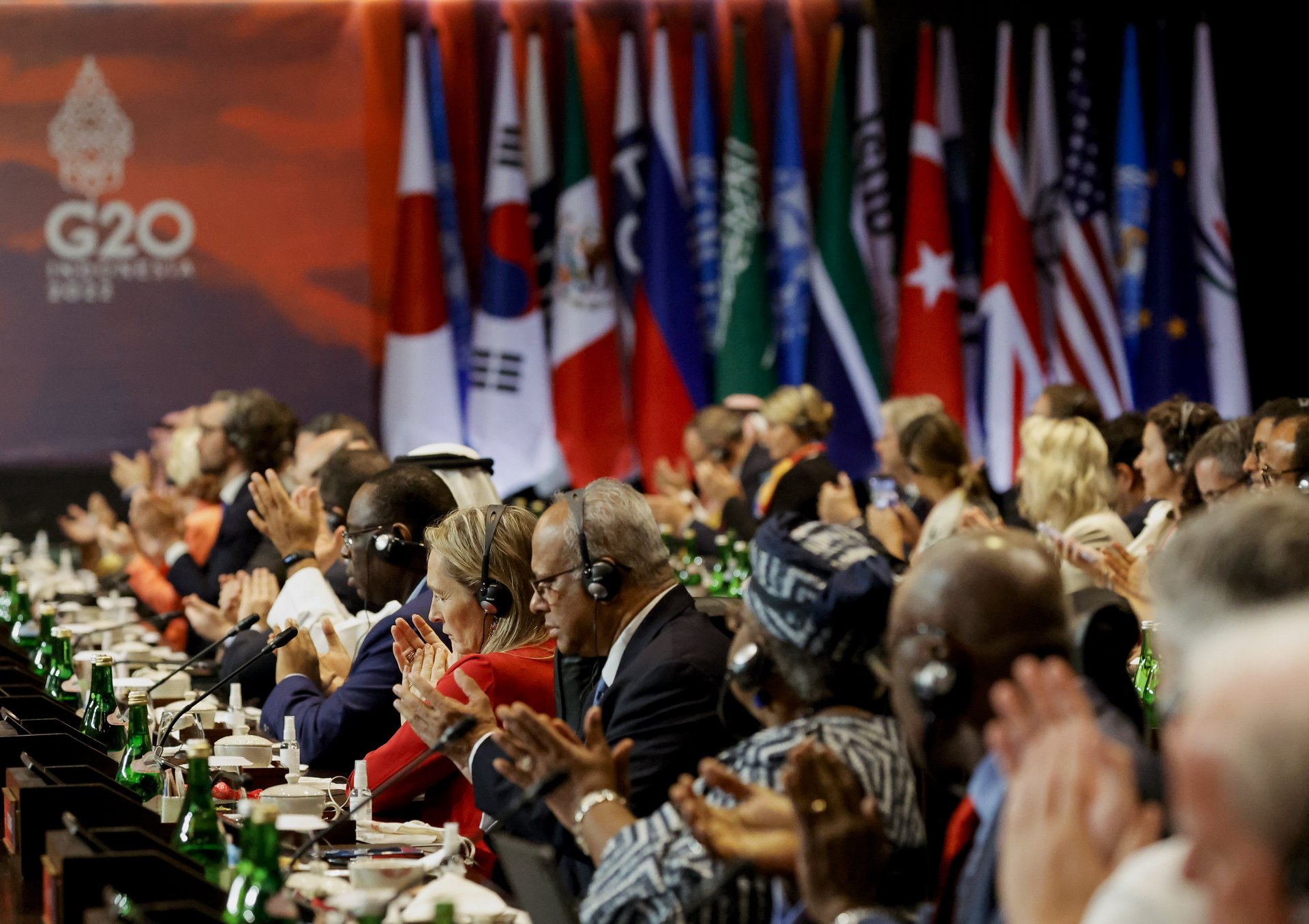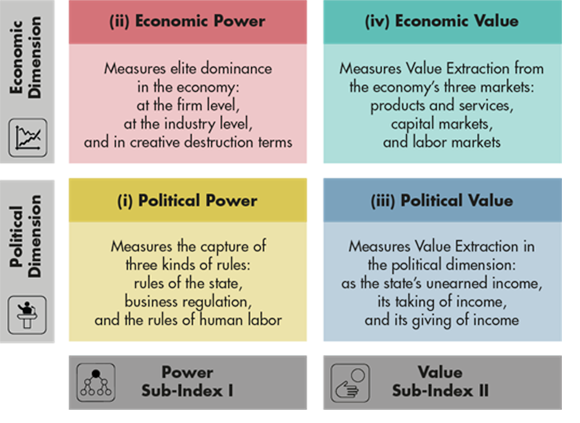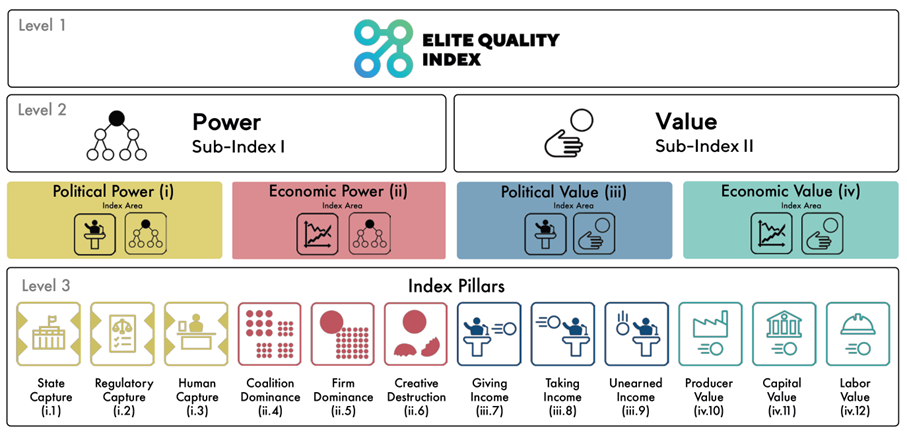

The Elite Quality Index (EQx) is an international comparative political economy index that measures 151 countries on whether their elite business models – on aggregate – create sustainable value, rather than generate revenue from transfers and thus extract value from society.
On 25 April 2024, the EQx2024 report will be released. Have a sneak peek at its results below or join us for the launch!
Can we measure if and when elites are ‘good’ or ‘bad’ for their nations? To what extent do elite business models focus on value creation rather than extraction? How powerful are elites? Do they use their power and coordination capacity to grow the economic pie for all, or do they rather attempt to increase their slice of the pie at the expense of non-elites? Compare up to five countries on their Elite Quality, the comparative power of their elites (a higher ranking denotes a less powerful elite) and the Value that they deliver.
Elites are narrow, coordinated groups that run the largest income generating business models in an economy.
The most intuitive way to understand Elite Quality is to imagine the economy as a pie. Low quality elites increase their slice of the pie at the expense of non-elites. High quality elites grow the whole pie for all.
Countries where high-quality elites create value and grow the overall pie can constructively address challenges like innovation, environmental protection, diversity and inclusion and AI alignment – this is sustainable.
Countries where low-quality elites transfer value and increase their own slice of the pie will face economic stagnation and social discontent from those they extract from – this is unsustainable.
First, you can compare national elite systems across the world based on their Sustainable Value Creation or check their Power and Value Creation relative to elites elsewhere. Based on the Panel EQx (PEQx) academic dataset, you can also look up the evolution of Elite Quality since 2005.
Specifically, three Elite Quality Country Comparison Tools are now available
Anybody curious about the world and its future. The Elite Quality Country Comparison Tools are primarily designed for political economy analysts, students, researchers, journalists, policymakers and politicians, investors, and business leaders, but can be used by anyone that wishes to know how countries compare in terms of their Elite Quality and sustainability.
The EQx has 12 Pillars that conceptually classify its component Indicators (146 were used in the EQx2024). Each of the 12 Pillars belongs to one of the four Index Areas: Political Power, Political Value, Economic Power and Economic Value. The Pillars serve the purpose of allowing analysis of specific dimensions of Elite Quality. Compare up to three countries based on their 12 Pillar rankings.
The EQx aims to establish the discrete Sustainable Value Creation of nations in comparative terms. Its conceptual focus is thus Value Creation or Value Extraction. Since there is no Value Extraction without Power, the index must also measure Power, which is defined as future potential Value Extraction. The two Sub-Indices, Power and Value, are then matched against the two dimensions of a political economy index: Political and Economic. The ensuing four Index Areas provide a framework for its 12 Pillars, each a unique conceptual category like Creative Destruction or Producer Value.

The EQx’s architecture has four levels. The aggregate Elite Quality country scores and global rankings are at level 1. At level 2, the two sub-indices of Power and Value, each with their Political and Economic dimensions, produce the four Index Areas, the framework of which is discussed above. The structure becomes more granular in level 3, with each of the 4 Index Areas having 3 pillars (for a total of 12 pillars). As Casas-Klett notes (2024): “(E)ach pillar embodies a clear and academically grounded idea that conceptually fits with one of the four index areas of level 2. Each pillar, in turn, then becomes the conceptual home of the level 4 indicators. These indivisible indicators are datasets taken from the multiple sources used by the index and constitute hard evidence of value creation/extraction phenomena relevant for the macro aggregate level. Each indicator is allocated to one of the 12 pillars based on conceptual proximity (this allocation may involve judgment as some indicators have a conceptual affinity to more than one pillar)”.
The meaningfulness of the EQx has been tested by Diebold (2022) who notes, upon performing a global uncertainty and sensitivity analysis, that the EQx country ranking “is largely stable for the top 50 countries, but exhibits considerable uncertainties especially for middle and lower performing countries. [The analysis] highlights the handling of missing data, the normalisation process and the weighting scheme as most important methodological choices”. For more details, see last year's EQx2023 annual report.

University of St.Gallen Professors, Post-doc and doctoral students, as well as Bachelor and Master students, are working jointly with academics worldwide on various facets of this research stream on elite agency. Guido Cozzi (School of Economics and Political Science) and Tomas Casas-Klett (School of Management) have being publishing the EQx empirical work on Elite Quality–now in its fifth annual iteration—since 2020, with the aim of having an impact on policymaking and the ongoing public discourse on Sustainable Value Creation. Together with two HSG researchers, Celine Diebold and Alexander Tonn, they have edited the Panel EQx (PEQx) data set. Robust theoretical work is meanwhile underway on the overarching Elite Theory of Economic Development. Finally, the conceptual apparatus of the EQx will be leveraged at the micro-level through a firm-level Sustainable Value Creation measurement project in collaboration with Martin Nerlinger (School of Finance).
The annual EQx reports provide a temporal snapshot of how a country’s elites perform in relation to each other in a particular year. But how does Elite Quality evolve over time? The PanelEQx (PEQx), a historical measure of annual Elite Quality starting in 2005, informs this tool. The PEQx2024 is based on a subset of the EQx2024 indicators. It is essential to specify the percentage of ‘missing values allowed’ you are comfortable with using (see box below). Compare up to five countries over time for their overall Elite Quality, Power, or Value rankings.
For further information on the Sustainable Value Creation of Nations research project contact
Tomas Casas i Klett (FIM-HSG)
Guido Cozzi (FGN-HSG)
For the forthcoming Sustainable Value Creation of Firms research project contact
Header Image: Keystone | EPA Reuters Pool | Willy Kurniawan / Pool